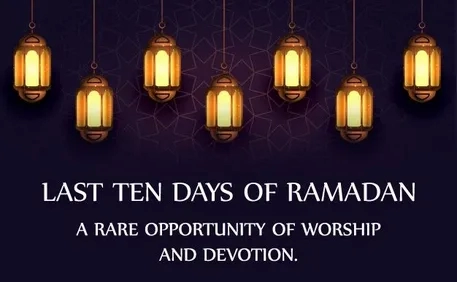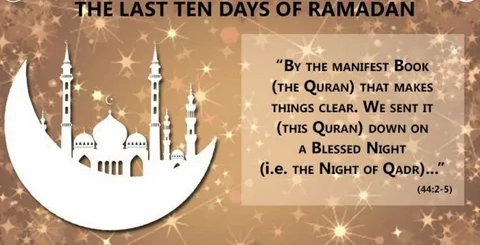Last Updated on January 8, 2025 by Arabian Tongue Team
Ramadan, the ninth month of the Islamic lunar calendar, holds profound significance for Muslims worldwide. It is a month of fasting, prayer, reflection, and community. As Ramadan draws to a close, the last 10 days mark a period of heightened spiritual devotion and anticipation. Let’s delve into why Last 10 days of ramadan holds special significance for Muslims around the globe.
The Significance of the Last 10 Days of Ramadan

The last 10 days of Ramadan hold immense significance in Islamic tradition. These days are particularly revered for their spiritual importance and the opportunity they offer for increased devotion and seeking forgiveness. Here are some key aspects of the significance of the last 10 days of Ramadan:
The Night of Decree (Laylat al-Qadr)
At the heart of the last 10 days of Ramadan lies Laylat al-Qadr, often referred to as the Night of Decree or Power. Described in the Quran as “better than a thousand months” (Quran 97:3), Laylat al-Qadr is believed to be the night when the Quran was first revealed to Prophet Muhammad (peace be upon him). Muslims fervently seek this night for its immense blessings and forgiveness.
Increased Spiritual Intensity
During the last 10 days of Ramadan, there is a palpable increase in spiritual intensity among Muslims. The realization that the blessed month is drawing to a close motivates believers to intensify their acts of worship, seeking closeness to the Divine and purification of the soul.
Opportunity for Redemption
For those who may have faltered earlier in the month, the last 10 days offer a golden opportunity for redemption. Muslims are encouraged to seek forgiveness, repent for past transgressions, and strive to improve themselves in the remaining days of Ramadan.
Preparation for the Last 10 Days

To make the most of the last 10 days of Ramadan, it is essential to prepare physically, spiritually, and mentally.
Physical Preparation
Maintaining good health and energy levels is crucial during the last stretch of Ramadan. Adequate rest, hydration, and nutrition are necessary to sustain oneself through the long nights of worship and prayer.
Spiritual Preparation
Preparing spiritually involves deepening one’s connection with Allah through increased acts of worship, such as prayer, recitation of the Quran, and remembrance (dhikr). Engaging in sincere repentance and seeking forgiveness clears the heart and soul, paving the way for a more profound spiritual experience.
Mental Preparation
Mental preparation entails setting clear intentions and goals for the remaining days of Ramadan. It involves focusing the mind on spiritual growth, self-improvement, and achieving a sense of inner peace and tranquility.
Recommended Acts of Worship
During the last 10 days of Ramadan, Muslims are encouraged to engage in various acts of worship to maximize blessings and spiritual rewards.
Increased Recitation of the Quran
The Quran holds a central place in Ramadan, and its recitation is especially encouraged during the last 10 days. Muslims strive to complete the Quran or recite significant portions of it, reflecting on its meanings and teachings.
Engagement in Extra Prayers (Taraweeh)
Taraweeh prayers are special nightly prayers performed during Ramadan. During the last 10 days, many Muslims devote extra time to these prayers, seeking closeness to Allah and the blessings of Laylat al-Qadr.
Seeking Forgiveness and Repentance
The last 10 days offer a prime opportunity for seeking forgiveness and repentance. Muslims engage in heartfelt prayers, asking Allah for mercy, pardon, and guidance on the path of righteousness.
Charity and Good Deeds
Acts of charity and kindness hold immense significance during Ramadan, particularly in its final days. Muslims are encouraged to give generously to those in need, thereby purifying their wealth and earning immense rewards from Allah.
Enhancing Personal Reflection
The last 10 days of Ramadan provide an ideal opportunity for personal reflection and introspection.
- Self-Reflection and Evaluation: Muslims are encouraged to reflect on their actions, intentions, and spiritual progress throughout the month. Honest self-evaluation helps identify areas for improvement and fosters personal growth.
- Setting Spiritual Goals: Setting spiritual goals for the remaining days of Ramadan helps maintain focus and motivation. Whether it’s memorizing a portion of the Quran, increasing acts of kindness, or overcoming personal challenges, setting specific goals adds purpose to worship.
- Seeking Inner Peace and Tranquility: Amidst the hustle and bustle of daily life, the last 10 days of Ramadan offer a precious opportunity to seek inner peace and tranquility. Muslims strive to disconnect from worldly distractions and connect deeply with their spiritual selves.
Nightly Routine during the Last 10 Days
Establishing a nightly routine during the last 10 days helps maximize productivity and spiritual growth.
- Utilizing the Time Wisely: With the nights of Ramadan being especially blessed, Muslims strive to make the most of every moment. Engaging in acts of worship, recitation of the Quran, and personal reflection fill the nights with spiritual nourishment.
- Balancing Worship and Rest: While worship is paramount during the last 10 days, it is essential to strike a balance between worship and rest. Getting adequate sleep and rest rejuvenates the body and mind, enabling better focus and concentration during worship.
- Creating a Schedule: Creating a structured schedule for the last 10 days helps optimize time management and productivity. Allocating specific times for prayer, Quran recitation, reflection, and rest ensures a balanced approach to worship.
Laylat al-Qadr: The Night of Power
The pinnacle of the last 10 days of Ramadan is Laylat al-Qadr, the Night of Power.
Meaning and Significance
Laylat al-Qadr holds immense significance in Islam, being the night when the Quran was revealed and when divine decrees for the coming year are ordained. Its blessings and rewards surpass those of a thousand months, making it a night of unparalleled spiritual opportunity.
How to Seek Laylat al-Qadr
While the exact date of Laylat al-Qadr is unknown, it is believed to fall on one of the odd-numbered nights during the last 10 days of Ramadan. Muslims fervently seek this blessed night through intense worship, supplication, and devotion.
Spiritual Practices for the Night
On Laylat al-Qadr, Muslims engage in special prayers, recitation of the Quran, supplication, and remembrance of Allah. The night is spent in deep contemplation, seeking forgiveness, and beseeching divine mercy and guidance.
Eid Preparation
As Ramadan draws to a close, Muslims prepare to celebrate Eid al-Fitr, the festival of breaking the fast.
- Preparations for Eid al-Fitr: Preparations for Eid al-Fitr begin in earnest during the last 10 days of Ramadan. Muslims clean their homes, purchase new clothes, and prepare special dishes to mark the joyous occasion.
- Maintaining Spiritual Momentum: Despite the festive atmosphere, Muslims strive to maintain the spiritual momentum gained during Ramadan. Acts of worship, charity, and reflection continue as believers transition from Ramadan to Eid.
- Celebrating with Gratitude and Joy: Eid al-Fitr is a time of celebration, gratitude, and joy for Muslims worldwide. It is a time to come together with family and friends, to express gratitude for blessings received, and to celebrate the successful completion of Ramadan.
FAQs
What is Laylat al-Qadr, and why is it significant?
Laylat al-Qadr, or the Night of Power, is the night when the Quran was first revealed to Prophet Muhammad (peace be upon him). It holds immense significance in Islam, being a night of forgiveness, blessings, and divine mercy.
How do Muslims determine the date of Laylat al-Qadr?
While the exact date of Laylat al-Qadr is unknown, it is believed to fall on one of the odd-numbered nights during the last 10 days of Ramadan, most commonly on the 27th night.
What are some recommended acts of worship during the last 10 days of Ramadan?
Recommended acts of worship during the last 10 days of Ramadan include increased recitation of the Quran, engagement in extra prayers (Taraweeh), seeking forgiveness and repentance, and acts of charity and kindness.
How can I make the most of the last 10 days of Ramadan?
To make the most of the last 10 days of Ramadan, focus on deepening your connection with Allah through increased acts of worship, reflection, and repentance. Seek Laylat al-Qadr with sincerity and devotion.
What is the significance of Eid al-Fitr, and how do Muslims celebrate it?
Eid al-Fitr is the festival of breaking the fast, marking the end of Ramadan. Muslims celebrate Eid with prayers, feasting, and joyous gatherings. It is a time of gratitude, charity, and unity among believers.
Conclusion
The last 10 days of Ramadan hold immense significance in the hearts of Muslims worldwide. It is a time of heightened spirituality, intense worship, and profound reflection. As believers strive to make the most of these blessed days, they seek Laylat al-Qadr, the Night of Power, and engage in acts of worship, repentance, and charity. May the blessings of Ramadan illuminate our hearts and guide us on the path of righteousness.

